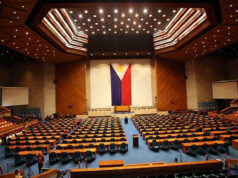Pension portability bill expected to help develop capital markets
A BILL permitting pension benefits to transfer along with workers as they change jobs is expected to boost retirement packages and help develop the capital markets, economic managers said.
Finance Secretary Carlos G. Dominguez III said at a hearing of the House Committee on Banks and Financial Intermediaries that the pension system is greatly underdeveloped, with pension assets currently equivalent to 16% of gross domestic product. He said a more acceptable ratio would be 100%.
Mr. Dominguez added that the pension system’s deficiencies stem from the passage of the Retirement Pay law, the features of which limit the size of retirement packages.
“The participation of large investors, such as pension funds, will help expand and diversify the investor base of our capital markets. This will mobilize a long-term supply of capital that can fund countless investment opportunities. At the same time, growing the pension fund system through prudent investments in the capital markets will ensure that our workers get to receive adequate benefits for them to live comfortably on once they retire,” Mr. Dominguez said.
The committee began deliberations Monday on House Bill 8938 or the proposed Capital Market Development Act of 2021. The panel’s chairman, Quirino Province Rep. Junie E. Cua, is the bill’s author.
The bill calls for the creation of a private pension system that is “fully-funded, portable, more actuarially fair, and stable.” It also aims to promote savings to develop the capital markets.
The bill’s explanatory note states that pension systems in other countries are “active participants in capital markets” and the Philippines’ current system is underfunded and inadequate to support retirement.
The reforms proposed include the establishment of the Employee Pension and Retirement Income (EPRI) Account which will be mandatory for all employees covered by the Labor Code of the Philippines. The account will be portable regardless of where the employee works, following the worker until retirement.
Both the employer and employee are required to contribute to the EPRI account.
The worker is also empowered to make investment decisions, selecting from among a menu of accredited investment products, including trust funds, mutual funds, annuities, stocks and other securities, and exchange-traded bonds.
Trade Secretary Ramon M. Lopez said at the hearing that reforming the pension system will lead to the development of capital markets and will sustain economic growth.
“There is a positive correlation between higher pension and higher real capital with greater savings and investment, creating more jobs for our people… these long-term savings are the sources of funds for long-term investment and there will be more funds for infrastructure… and education,” he said.
Securities and Exchange Commissioner Kelvin Lester K. Lee said at the hearing that the SEC supports the bill, which it will play a role in implementing.
“The SEC looks forward to the invigoration of the capital market through this bill and through the joint efforts of the government agencies involved… namely the Department of Finance, Bangko Sentral ng Pilipinas (BSP), the Insurance Commission and ourselves the SEC,” he said.
The BSP and the Bureau of the Treasury also expressed support for the measure at the hearing.
Labor Secretary Silvestre H. Bello III said more safeguards are needed to ensure workers receive appropriate pensions upon retirement.
“For workers who have had multiple employers and have rendered only a few years with their final employer, this means receiving a small amount upon retirement instead of the full value that accrued to them for their working lives,” he said at the hearing. — Gillian M. Cortez



